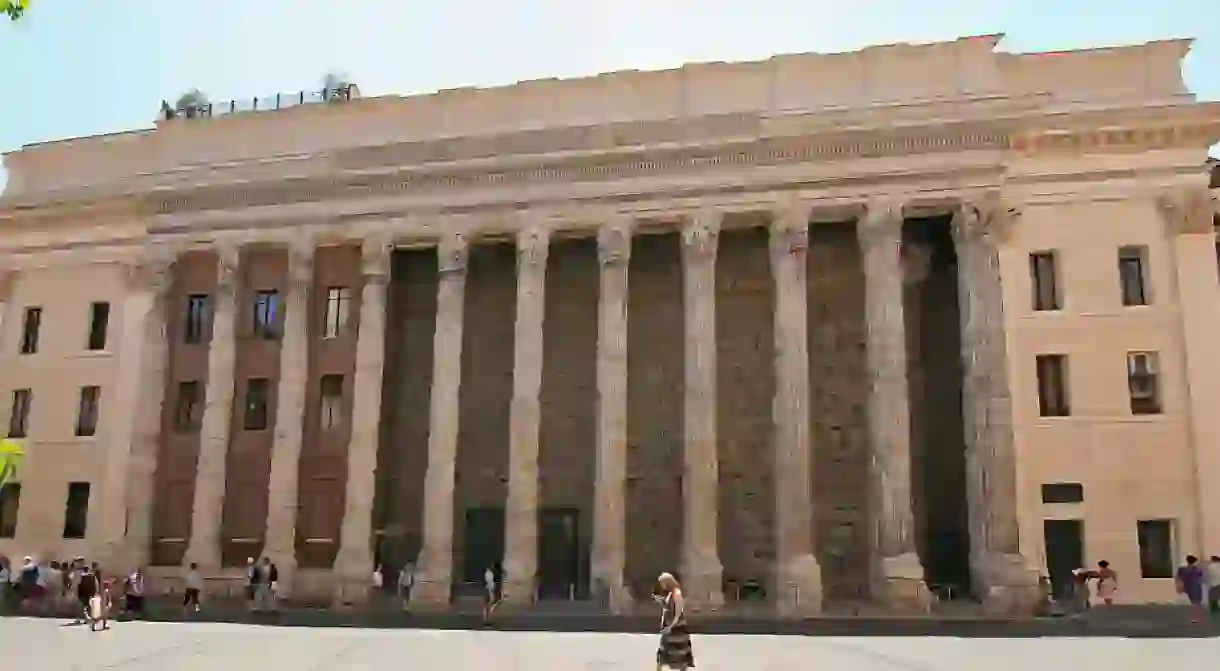The Legacy of Hadrian: Rome's Good Emperor

The only three bronze heads of Hadrian found to date are now on display at the Israel Museum. But, who was Hadrian and what do we know about him? Hadrian was born ‘Publius Aelius Hadrianus’ in 76 AD into a Hispano-Roman family. Both parents died by the time Hadrian was 10 years old, leaving him with a younger brother and sister with whom he never bonded. He himself was adopted by a relative of his father named Trajan. There remains no record of what happened to his siblings. Although born in Rome, Hadrian was known as a ‘Greekling,’ a lover of Greek studies and culture. Proof of his attachment to all things Greek was his desire to make Athens the cultural capital of Europe.
At the age of 14, Hadrian entered the military. However, his main interests were hunting and the luxurious life. This was quite an embarrassment to Trajan, and so he called him back to Rome. Trajan then appointed him as one of the ten judges of the inheritance court in Rome – a prestigious position. This gave him the impetus to rejoin the military, in which he finally succeeded – he actually succeeded in all of his efforts. He became a Roman senator, which was the governing and advisory council of ancient Rome.

Hadrian rose quickly in the political ranks as well, becoming a ‘praetor’ – a judicial officer who had supreme authority in cases of equity. In addition, Hadrian was responsible for the the production of public games and had supreme authority in the government. He achieved being crowned with the title of ‘consulate,’ an extremely coveted position.
On the other side, Hadrian and individuals of the elite faction were homosexuals. They preferred young boys instead of women. Marriage was a political alliance, for the purpose of lust and bearing children. Hadrian’s lover was Antoninus, who drowned mysteriously. Hadrian was devastated and mourned him his entire life.
Political situations were never stable and so, politically, Hadrian began to feel as if he were a sidekick with severe ramifications. Hadrian’s career came to a standstill that lasted for 10 years. But Hadrian would not be beaten. He involved himself in the culture of his beloved Greeks and in the good of his own nation.
It’s not known why Hadrian’s star dimmed when Trajan ascended as Emperor, and then suddenly without explanation, his star brightened again. He soon learned that Trajan had appointed him as successor to the throne. It was not too long that Trajan passed, and Hadrian was proclaimed Emperor.

The new Emperor began his reign by canceling debts to the state, thus popularizing himself with his subjects. He also reinforced gladiatorial displays and dispensed favors by appointing those who had helped him to government positions. Hadrian, as Emperor, remained in Rome for three years. He then left Rome, stating that he needed to review the political situation in his realm. In actuality, Hadrian had an insatiable desire to travel and explore. Nevertheless, he was a very capable Emperor.
He developed welfare programs for the indigent and visited all of his territories with the intention of learning the positives and negatives of each one and how he could improve those that needed help. He was truly interested in the difficulties faced by his provinces. This can be proven by his building of ‘Hadrian’s Wall’ to protect the Brit-Roman province from the Barbarians. Hadrian had been away from Rome for ten years!
Hadrian had plans to rebuild Jerusalem, which had been destroyed by Titus in 71 AD and was never rebuilt. He planned to rebuild Jerusalem and call it Aelia Capitolina. His plan was to make it a grand Roman city with a temple to Jupiter Capitolinus on the Temple Mount. He would call Judea Syria-Palestina. He built the Pantheon and the Temple of Venus and Roma.
[jwplayer nf8AFPzL-RnIdcM25]
His ideas were a travesty to the Jewish people and brought about the war of the Jews under the aegias of Simeon Bar-Kochba. The result was the death of Bar-Kochba and one half million Jewish individuals. Another major Jewish war was the one in Beitar. The city fell after three weeks.
Hadrian was buried twice in different places as to conceal his body from enemies. Finally, it was decided to cremate him and place his ashes in a mausoleum he had built in Rome. Hadrian was subsequently deified, despite the amount of people he had killed. Although he was a brilliant, cultural administrator, he was a fearsome dictator and frightened of by all.
Upon his death, a short poem was found in the mausoleum telling us about his feelings of failure and disappointment:
Little Soul by Hadrian
Little soul. Little stray/Little drifter
Now, where will you stay/All pale, all alone
After the way/You used to make fun of things
The rest of the poem was never found.














